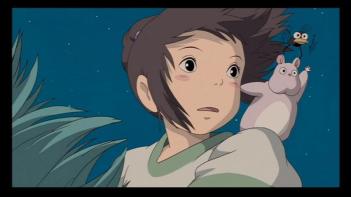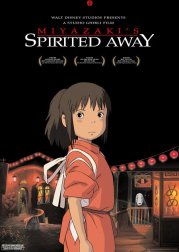Chihiro: “You don’t remember your name?”
Haku: “No, but for some reason I remember yours.”
I still remember when my dad picked up a DVD titled Spirited Away from one of those stands next to the supermarket cash register. I was in third grade back then and eyed the girl robed in pink attire on the DVD cover with curious eyes. She seemed about my age, judging from the chubby cheeks and the way she looked hesitantly over her shoulder as if searching–but for what?
I later found out that her search is both physical and spiritual; her main mission is to retrieve her parents from the pigs’ pen (yes, they were transformed into pigs after gorging on spirit food without permission). But her ulterior quest is to retain memory of who she formerly was before she unknowingly trespassed into the spiritual world and help recover her newfound friend Haku’s real identity as well (for those who haven’t watched this animation, Haku was a river god before he lost his memory to a greedy bathhouse owner named Yubaba).
The motif of lost identity and the covert reunion of human relationships is interweaved throughout the animation. In the end, Chihiro–or the girl mentioned above–ultimately emerges from the spiritual world as a mature young lady; before her entrance, she is pigheaded and self-centered, caring only for her whims. However, after undergoing a series of challenges in which she receives help from various benefactors or becomes one herself, she realizes that love triumphs in the end. This message echoes throughout other works such as in Tuesdays with Morrie, in which Morrie states “love wins, love always wins.”
Love wins, love always wins.
I didn’t comprehend this message until I was much older–perhaps in middle school? What enraptured my third grader brain though was the depiction of Japanese culture within the animation.
Prior to watching this film, I had zero interest in Asian culture and my Korean roots. While Japanese and Korean culture are two disparate subsets within Asian culture, they still share enough similarities across philosophy and architecture to be reminiscent of the other. For the first time, I was enlightened of how the spiritual world is at once a reflection of human flaws and avarice, and Asian wisdom grounded on peaceful mantra. The themes of structural social hierarchy and relationships bound by karma or yinyun (인연) interlaced throughout the plot parallel the interactions commonly seen among humans in Korean and Japanese society.
I was still living in America when I first saw the film, but I could sense that Hayao Miyazaki, the director of Spirited Away, was conveying a universal message through cultural details indigenous to Japanese culture. The thought of utilizing cultural elements specific to one country as the basis for a much larger concept capable of appreciation by a foreign audience astounded me. To be candid, I wasn’t very familiar with Asian culture back then. I had always been exposed to American culture through my school, friends, and neighborhood pals. My contact with the few Asian students at my school wasn’t enough to convince me that the invisible wall between Western and Eastern culture could be overcome. There was just something too alien about Asian culture.
I was very wrong.
Spirited Away was the first of many Miyazaki works that I began to look towards inspiration when crafting stories of my own. Writing short stories became a process through which I could rediscover my identity as a Korean and nurture pride in traditional Korean culture. If Miyazaki embraced traditional Japanese culture and employed it as a means to reach a wide foreign audience, why should’t or couldn’t I? While the artistic medium Miyazaki uses is different from mine, we both have the same goal of establishing rapport with audiences that may be unfamiliar with Asian culture by relying on the very foreign element itself. This challenge is essentially what drives Miyazaki to paint a world in which the audience can emerge from enlightened of and captivated by the different ambiences of Japanese culture.
While Chihiro’s search for her family and name might be over, the search for identity lives on through me; I will continue to write, integrating Korean culture into my works from time to time, in hopes that I might rediscover a part of my cultural history through one of my characters.


